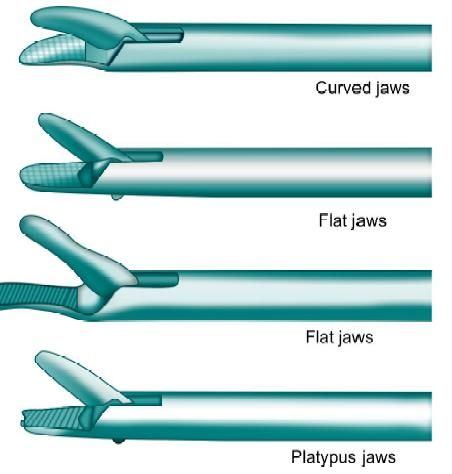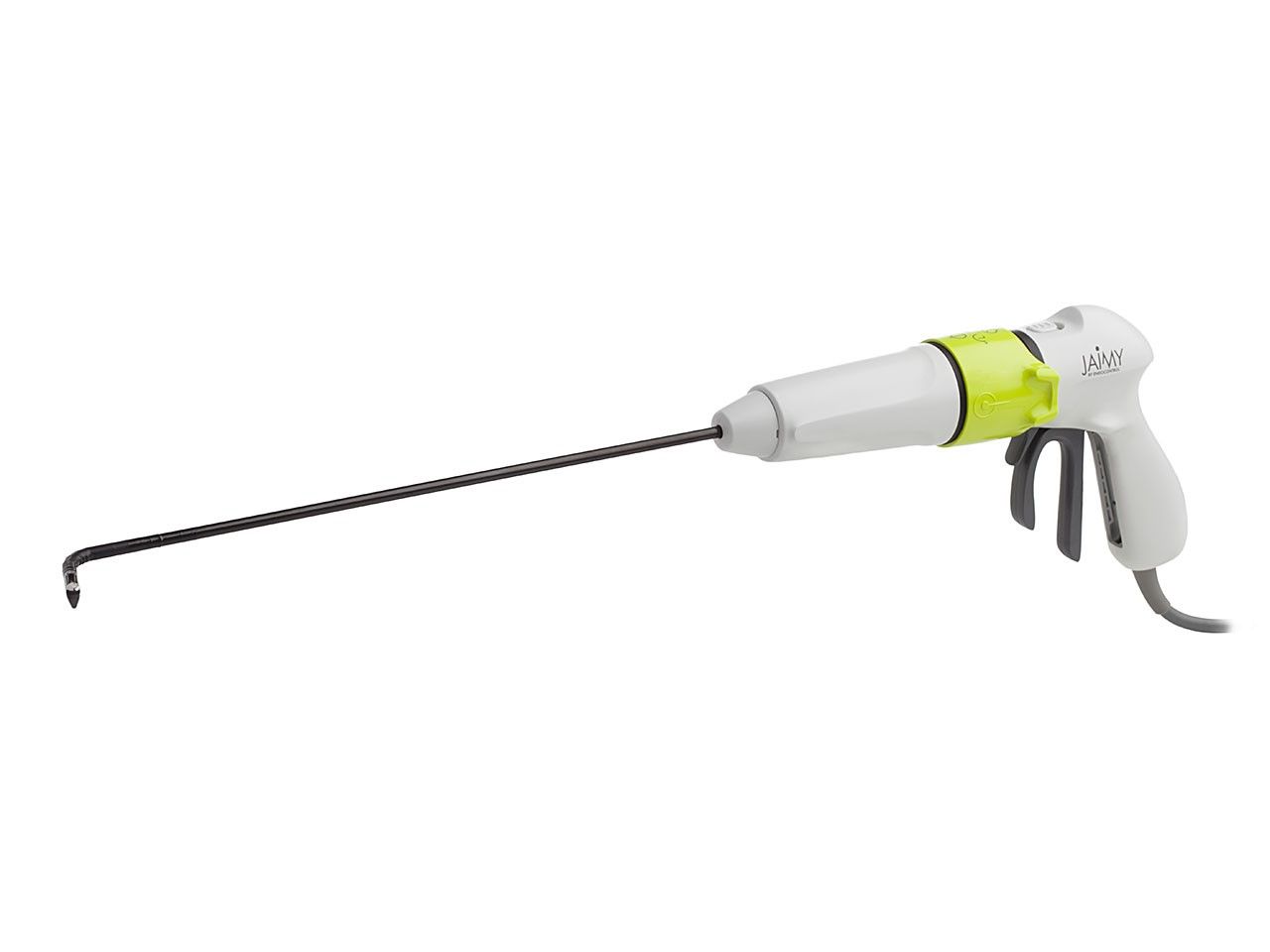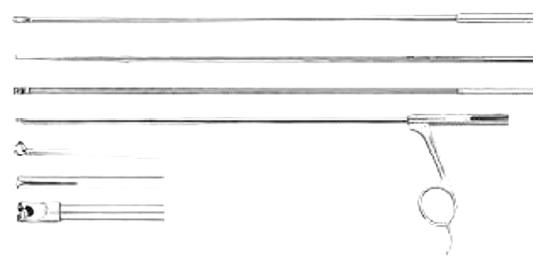Laparoscopic Needle Holders
Needle holders should grasp the needle rock solid hard to prevent rotation. Hence, until now, reusable needle holders are not available. Needle holders have different types of jaws.

The jaw of a needle holder

Laparoscopic straight handle needle holder

Different types of jaws of a needle holder
The flat grasping surface makes it possible to turn the needle in all directions as in conventional surgery. Dome-shaped indentation at the tip automatically orients the needle in a particular direction although this function is not always useful, it can sometimes make it easier to grasp the needle. Laparoscopic knotting and suturing should be learned on a good quality endo trainer. The art and science of laparoscopic suturing and knotting are explained later in the tissue approximation technique. Surgeons should slowly learn these techniques. They will develop their confidence once capable of suturing inside the abdominal cavity and as a result conversion rate will also decrease. Many automatic laparoscopic suturing devices are invented for intracorporeal suturing but none of them are substitutes for manual laparoscopic suturing because these devices can work only under appropriate tissue planes suitable for their application.
Robotized Laparoscopic Needle Holders

Robotic Needle Holder
JAIMY™ Advance is the first motorized laparoscopic 5mm needle holder is the first of its kind robotized needle holder. This easy to use, reusable, and unique but expensive robotic needle facilitates advanced laparoscopic suturing. It is developed to fit all hand sizes and simple one-handed operation. With bidirectional flexion and unlimited rotation of its end-effector, this needle holder can access difficult to reach areas in the abdominal cavity. It overcomes the ergonomic restrictions of conventional laparoscopy without increasing incision size, hence making complex procedures easier. Reusable, space-saving, and easy to use, a motorized needle holder, takes minimally invasive surgery a step further. Although it must be practiced using by the surgeon and if the surgeon is good in laparoscopic suturing by conventional needle holder this device is not required.
Knot Pusher
Although pre-tied loops are available in the market surgeon should learn how to tie these extracorporeal knots.

Laparoscopic Knot Pusher
The pretied loop can be used for any free structure like appendix but for a continuous structure like cystic duct surgeon has to perform extracorporeal knotting intraoperatively. For extracorporeal knotting, knot pushers are used. These knot pushers are of either closed jaw or of open-jaw type.

Pretied loop
Needle holders should grasp the needle rock solid hard to prevent rotation. Hence, until now, reusable needle holders are not available. Needle holders have different types of jaws.

The jaw of a needle holder

Laparoscopic straight handle needle holder

Different types of jaws of a needle holder
The flat grasping surface makes it possible to turn the needle in all directions as in conventional surgery. Dome-shaped indentation at the tip automatically orients the needle in a particular direction although this function is not always useful, it can sometimes make it easier to grasp the needle. Laparoscopic knotting and suturing should be learned on a good quality endo trainer. The art and science of laparoscopic suturing and knotting are explained later in the tissue approximation technique. Surgeons should slowly learn these techniques. They will develop their confidence once capable of suturing inside the abdominal cavity and as a result conversion rate will also decrease. Many automatic laparoscopic suturing devices are invented for intracorporeal suturing but none of them are substitutes for manual laparoscopic suturing because these devices can work only under appropriate tissue planes suitable for their application.
Robotized Laparoscopic Needle Holders

Robotic Needle Holder
JAIMY™ Advance is the first motorized laparoscopic 5mm needle holder is the first of its kind robotized needle holder. This easy to use, reusable, and unique but expensive robotic needle facilitates advanced laparoscopic suturing. It is developed to fit all hand sizes and simple one-handed operation. With bidirectional flexion and unlimited rotation of its end-effector, this needle holder can access difficult to reach areas in the abdominal cavity. It overcomes the ergonomic restrictions of conventional laparoscopy without increasing incision size, hence making complex procedures easier. Reusable, space-saving, and easy to use, a motorized needle holder, takes minimally invasive surgery a step further. Although it must be practiced using by the surgeon and if the surgeon is good in laparoscopic suturing by conventional needle holder this device is not required.
Knot Pusher
Although pre-tied loops are available in the market surgeon should learn how to tie these extracorporeal knots.

Laparoscopic Knot Pusher
The pretied loop can be used for any free structure like appendix but for a continuous structure like cystic duct surgeon has to perform extracorporeal knotting intraoperatively. For extracorporeal knotting, knot pushers are used. These knot pushers are of either closed jaw or of open-jaw type.

Pretied loop





